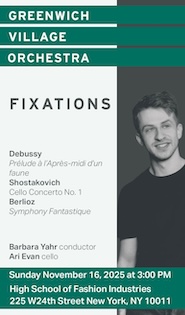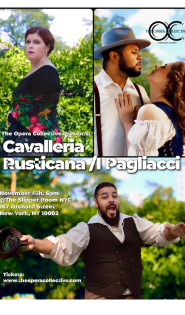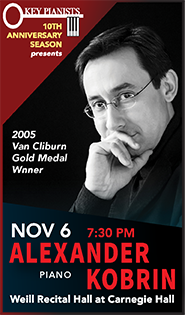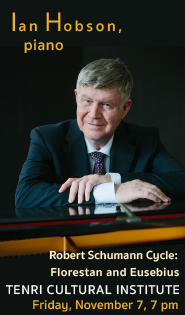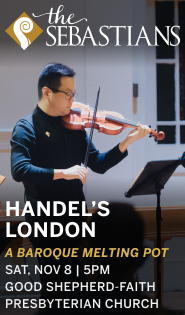Daniel Hope and Chamber Music Society mark Menuhin centennial with thoughtful panache
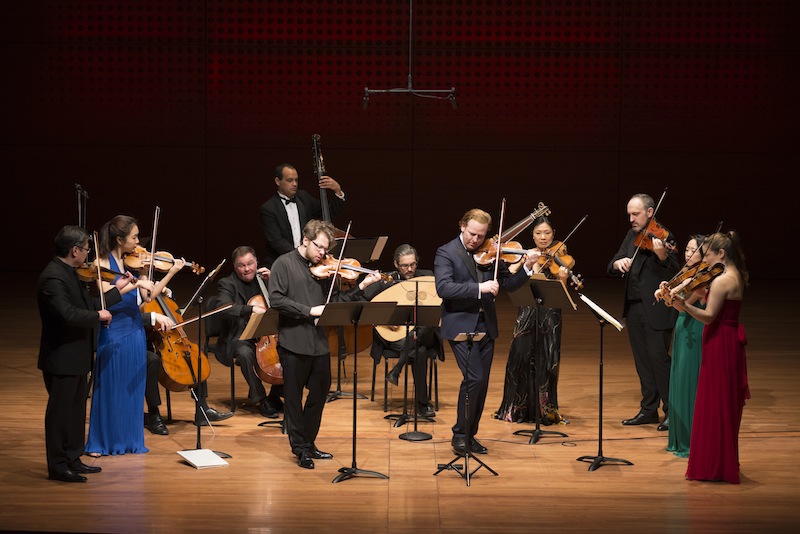
Daniel Hope and Alexander Sitkovetsky performed Bach’s Concerto for Two Violins Friday night with the Chamber Music Society of Lincoln Center. Photo: Tristan Cook
Daniel Hope knows how to throw a party.
For the Chamber Music Society of Lincoln Center–and to mark what would have been Yehudi Menuhin’s 100th birthday next month–Hope assembled a slate of works by composers connected to the late artist, who died in 1999.
There’s a strong link between the two violinists: Menuhin taught Hope when he was just nine years old. The program had symmetry: each half began with a Baroque gem (Bach and Vivaldi) and ended with a classic (Mendelssohn and Bartók), with short works from the 20th century in between.
Though Bach’s Concerto in D minor for Two Violins is one of his most popular works, on this occasion it seemed to reach even more vivid heights than usual. With the ensemble standing (except for cellos, lute, and guitar), Hope and Alexander Sitkovetsky led the group in bright, primary colors, encouraging lightness, even though modern instruments were used. The two violinists’ tone in the second movement was a wonder, with finely shaded dynamic levels. The final Allegro—bold and bristling, with vigorous accents—was notable for its detail, enhancing the illusion of an echo between the two instruments.
The four contemporary works were originally dedicated to Menuhin. Arvo Pärt’s Darf ich… (“May I…,” 1995) is a beautiful miniature for violin solo, strings, and a lone bell, the latter played by Ian David Rosenbaum. Benny Kim masterfully handled the robust solo line, which ends with some whistling harmonics sailing over his colleagues’ ethereal tapestry.
Written the same year, Philip Glass’s Echorus for Two Violins and Strings is a loving example of the composer’s typical arpeggiated style. Soloists Jessica Lee and Danbi Um offered gentle, persuasive pulses, gracefully intertwined with the ensemble.
An arresting unison opens Mendelssohn’s Concerto in D minor for Violin and Strings, completed when the composer was just 13 years old. Unlike his later, celebrated fiddle concerto in E minor, this early work is virtually unknown, and it is a marvel. Hope tackled the challenging solo line, and the first movement’s cadenza with daunting bravura. After the serene middle movement, the exhilarating gypsy dance that follows was arguably the night’s most viscerally exciting sequence, with Hope navigating a perilously fast tempo.
To mark another birthday—Vivaldi would have been 338 the day of the concert—Hope and Kim led an effervescent romp through the Concerto in A minor for Two Violins, RV 522. The ensemble’s sheer exuberance won the day, along with carefully considered phrasing. Daniel Swenberg on guitar (also on lute in the Bach) added both texture and delicate rhythmic trussing.
Also composed in 1995, Shulamit Ran’s Yearning is scored for violin and strings with cello obbligato (the latter masterfully done by Keith Robinson), in a 2015 arrangement made for these forces. Opening tremolos in the cellos and basses were soon picked up by the rest of the group, as the solo violin—here the superb Bella Hristova—began a haunting line that underlined the work’s title. At the conclusion, as Hristova waved the composer onstage, it was heartening to see the composer receive some of the night’s loudest ovations.
In 2009 Hope commissioned Bechara El-Khoury to write Unfinished Journey, inspired by the title of Menuhin’s 1977 memoir. The Lebanese-French composer’s gorgeous result is a sequence of slow-moving chords for the massed strings, over which Hope spun a series of repeated mournful utterances. Its reflective, sober cast made a fine preface for the evening’s close, a dashing flight through Bartok’s Romanian Dances. One wishes most birthday parties could be this festive.

